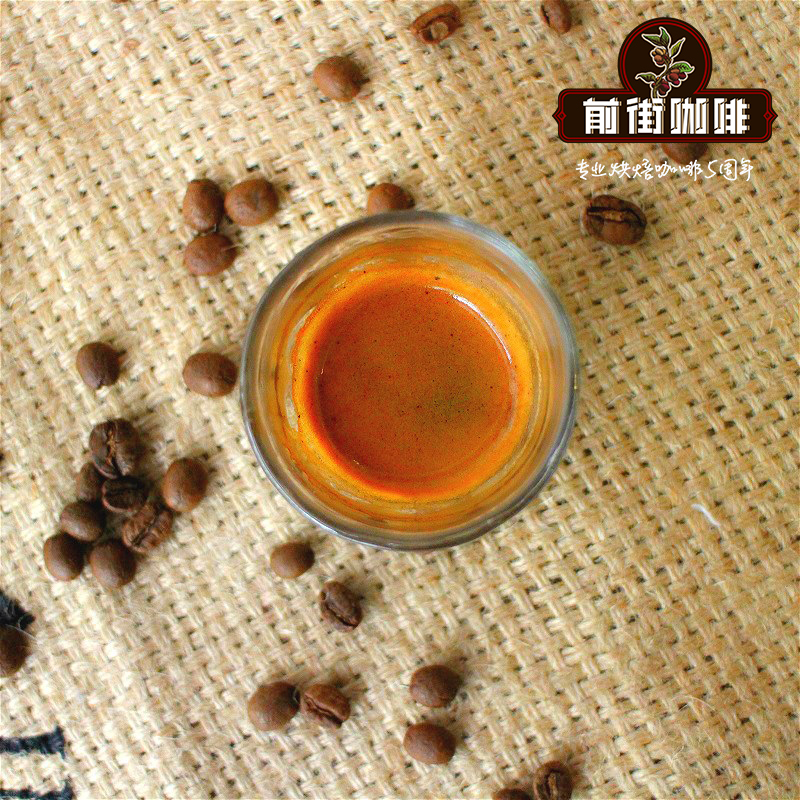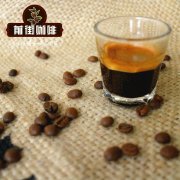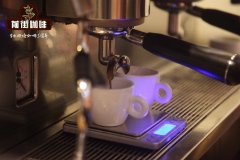Espresso Coffee Machine nanopresso out-of-box Evaluation of the difference between espresso and ristretto

Professional coffee knowledge exchange more coffee bean information please follow the coffee workshop (Wechat official account cafe_style)
. If you want to enjoy coffee DIY at home, you can find all kinds of devices on the market, whether electric or manual, have their own unique fun. It takes a lot of work to finish a cup of coffee by hand, but from the smell of coffee in the space when grinding beans, the good feeling is triggered. It's a complete color, smell and taste experience, and it's not just about drinking coffee. Although the procedure is cumbersome, it is always fun for people who like to drink coffee.
Hand flushing or siphon pots are familiar manual devices, but Italian espresso (espresso) can now do so. The protagonist of this article, "WACACO nanopresso", is a magical unplugged product. For me, it may be more appropriate to describe it as "espresso little angel".
In order to make it easier to read, I will divide the article into several parts, which you can understand slowly from shallow to deep.
Part 1-package appearance and accessories
Exquisite packing box, the main vision on the front is the operation demonstration of nanopresso, and the back is the detailed illustration steps.
(link to Flickr photo album, click to view high-definition photos.)
A group photo of accessories.
Clockwise, nanopresso body, hard protection box, warranty card and instructions, packing box, two vermicelli stickers.
The spirit of this product is "take it with you" (espresso on the go).
Nanopress body size is only 156x71x62mm, all accessories can be included in it. If you put a hard shell a little bigger than it, you can take it with you, and it will be highly portable.
A tailor-made protective shell.
The so-called "hard" means that it is pre-molded, which is quite strong and elastic, and can be anti-collision and shock-proof.
The appearance is similar to a large capsule with three-section combined structure.
(note: the demonstration nanopresso is black and correct, because of the lighting effect, it may be slightly silver gray)
After rotating up and down, there are many hidden mechanisms inside.
The upper row of the central cylinder is the body, the function is to pump and pressurize the system. On the left is the filter system, and on the right is the hot water cup and coffee cup (stacked together).
The lower row is a measuring cup and a cleaning brush.
The hot water injection inlet of the body. (note: when in use, this part is face down first, and after the hot water cup is tightened, it is turned upwards.)
The pressurized hot water outlet of the body. (note: when used, it is facing down)
The circular groove is designed to place and fix the coffee powder cup.
A close-up inside the hot water cup.
In fact, it is stacked in two sets of large and small cups, with hot water cups inside and drinking cups on the outside.
In other words, one is used for hot boiled water and the other for coffee liquid.
The filtration system consists of a filter head and a coffee powder cup.
The internal situation.
The state of being received or used.
In the middle is the piston (pressure rod). In the locked state, rotating counterclockwise releases the piston. Rotate clockwise and press down to secure the piston.
When in use, like a pump motor, pressing down the piston can increase the pressure.
Part 2-hands-on demonstration
Bean grinder debut, this is Hario Ceramic Coffee Mill Skerton simple hand bean grinder MSCS-2TB (ceramic knife grinder) (the open-box article I wrote earlier, please refer to here).
The purpose of warming the equipment first is to prevent the hot water from being cooled by the equipment.
This action can be soaked at home or in the office, and hot water can be used outdoors.
The standard specification is 8 grams at a time, it is better to observe with an electronic scale. The weight of coffee bean / coffee powder is the first factor affecting the quality of espresso. Nanopresso is 8g, which has been defined, so it can be completely controlled.
Generally, you can buy enough electronic scales. After the empty plate is put on it, it will return to zero once. What is shown on the screen is the weight of the beans.
If there is no electronic scale, the attached measuring cup is also quite accurate, full of beans will weigh about 8g.
As long as the beans are fresh, the taste will not be so bad. Choose the popular price model which is very OK. Please point to the coffee shop for nominal coffee beans or Italian deep-baked beans.
The second factor affecting the quality of espresso is the thickness of the powder, which is generally recommended in fine grind (fine grinding). The problem is that the fine does not have a clear scale, and the number of each brand of bean grinder is not the same.
Therefore, at the beginning, you must actually test it with your own bean grinder to help establish a reference.
Taking the Hario MSCS-2TB demonstrated in this paper as an example, it is most appropriate to set the grinding degree of the callback 5 teeth after tightening. (note: the 1st tooth is counted from the complete gap)
Too fine grinding can make it difficult to get out of the water (for example, 1 tooth), and even the filter cannot be turned away to clean after it is stuck.
I encountered once that the solution was to move the hot water cup away and soak the body together with the filter in cold water. It will slowly relieve pressure, and it will continue to flow out the coffee liquid, which will be opened with the help of a towel after it has been set still for a period of time.
The warm parts are still hot, please take them carefully.
It is recommended to grind beans before use. Whether the grinding thickness is appropriate, you can observe the water output of coffee liquid and then fine-tune it.
Also take the Hario MSCS-2TB bean grinder as an example, after adjusting to 4 teeth, it can produce water, but it is not smooth enough. If you see a drop instead of a water column, please increase the grinding degree by one frame, which can be improved.
After the measuring cup is filled with 8g coffee powder, pour directly into the filter cup by covering and turning. The design of the measuring cup is a little smaller than the filter cup, so it is easy to operate.
Wipe the bottom of the cup flat.
The action of compacting coffee powder is similar to the usual espresso pre-preparation.
Put the bottom of the coffee powder cup into the round groove of the body and get stuck, its design is very intuitive, once done will be familiar.
Wipe off the excess powder on the edge of the cup with your fingers, then aim it with a metal strainer and cover it. In fact, the coffee powder cup is turned upside down, but it doesn't matter, it's just a process, because when combined with a metal filter, it is sealed.
The rim of the cup touches the rubber gasket, so the powder needs to be removed so as not to affect the air tightness.
Pour hot water into the hot water cup, the standard water of this machine is 80 cc, be sure not to exceed the mark line.
The excess water will certainly overflow after assembly and may be scalded, so it can not be filled with too much water.
Flip the nanopresso 180 degrees, let the nanopresso outlet down, and align the coffee cup. (it is recommended that the coffee cup be soaked in hot water or warm cup.)
Hold the water cup in one hand and prepare to press in the other hand. Release the piston rod and begin to press rhythmically. The first 7-8 times are pressurized but will not come out of the water, but don't worry, the following compressions will begin to flow out the first wave of dark brown coffee liquid.
Nanopresso has a patented design with a pressure value of an amazing 18 bar (260 PSI).
Then there will be bubbles, water columns, and slowly forming, top reddish-brown crema.
I'm so surprised! It's great that manual nanopresso can make this kind of coffee.
Just mentioned, you can observe the amount of coffee liquid output, if the process to water column-based, is the appropriate degree of grinding.
If the effluent is in the form of a drop, you should adjust the bean grinder to make the grinding degree a little thicker and try again until you see the water column.
Bean quantity and grinding degree are the most basic factors of SOP (standard operating procedure). As long as you follow it, you can get a delicious cup of espresso every time!
Crema disappears quickly.
So some people like to drink it down.
The crema on the wall of the cup is authentic and a trace of delicious food.
The glass is mainly used to demonstrate crema and coffee liquid levels. Usually use a small espresso cup, feel more "speed match".
Part 3-Daily cleaning and maintenance
After drinking the coffee, the filter is no longer hot, and it turns out to be what it looks like in the picture.
Coffee cakes are relatively humid, but they are clumpy inside because nanopresso is not continuously heated by high temperature steam.
Usually take apart the filter and rinse it with tap water.
I have misused ultra-fine powder before. I have tried to install a cup of hot water, run through the pressurization process, and wash out a lot of residual powder.
The filter can be further decomposed. After making espresso for about 20-30 times, please remove the photo to this extent and clean it.
According to the original factory recommendation, about half a year (300shots), should disassemble the metal mesh (turn 3 screws), do deep detail cleaning.
I started by saying that nanopresso is an "espresso little angel".
Yes, but it also has the dark nature of an imp, and it will make you addicted and addicted to it.
The previous generation of nanopresso is called minipresso, but the name nano refers to its small appearance, but in fact its design is very exquisite and its inherent integration is higher, including higher pressure value, water capacity and powder quantity than the previous generation.
Huge 18 bar extraction pressure, but easy to operate, easy to use, no matter boys or girls, can make espresso anytime and anywhere.
There is a long-bought German K-brand electric espresso machine at home. By contrast, nanopresso is obviously much easier to use. It is lightweight, high success rate, easy to carry and easy to clean. Most importantly, it's easy to get a good espresso. After in-depth experience, this small machine completely subverts my imagination. It's really special!
To solve your espresso addiction, WACACO nanopresso is undoubtedly the best antidote!
Important Notice :
前街咖啡 FrontStreet Coffee has moved to new addredd:
FrontStreet Coffee Address: 315,Donghua East Road,GuangZhou
Tel:020 38364473
- Prev

What kind of coffee is Espresso? how does Espresso taste it? How to drink Starbucks espresso
Professional coffee knowledge exchange more coffee bean information please follow the coffee workshop (Wechat official account cafe_style). I believe that Espresso for many people will feel very strong, very bitter, but why would anyone like to drink Espresso? As baristas and bakers, we all like to drink Espresso. Maybe you think because it has only a small cup, you can.
- Next

How to distinguish the meaning of Espresso and Ristretto espresso Test espresso double
Professional coffee knowledge exchange more coffee bean information please follow the coffee workshop (Wechat official account cafe_style). It is well known that Espresso is the base of many espresso and the soul of the espresso family. No matter which kind of beans, deep culture or shallow culture, can be used as Espresso. However, I believe many coffee lovers will notice that Espress
Related
- Beginners will see the "Coffee pull flower" guide!
- What is the difference between ice blog purified milk and ordinary milk coffee?
- Why is the Philippines the largest producer of crops in Liberia?
- For coffee extraction, should the fine powder be retained?
- How does extracted espresso fill pressed powder? How much strength does it take to press the powder?
- How to make jasmine cold extract coffee? Is the jasmine + latte good?
- Will this little toy really make the coffee taste better? How does Lily Drip affect coffee extraction?
- Will the action of slapping the filter cup also affect coffee extraction?
- What's the difference between powder-to-water ratio and powder-to-liquid ratio?
- What is the Ethiopian local species? What does it have to do with Heirloom native species?

